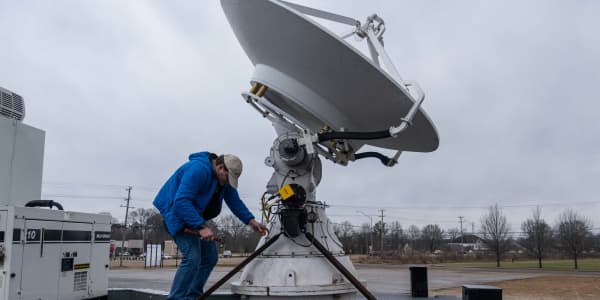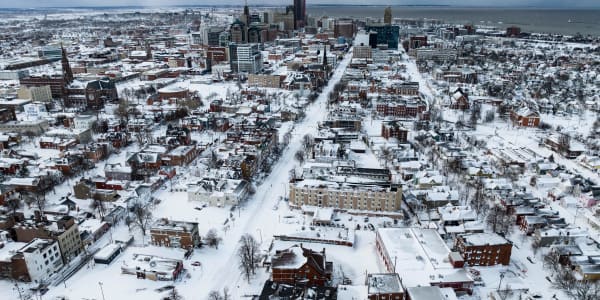More than 10 million home robots have been sold worldwide by iRobot, the publicly traded Massachusetts-based company well known to humans—and felines—for its automated Roomba vacuum cleaners.
When it was founded 25 years ago, iRobot was on the cutting edge of the robotics industry in a state whose history in artificial intelligence and robotics research dates back to the Massachusetts Institute of Technology (MIT) of the 1950s. Today, iRobot is one of about 150 robotics companies, large and small, in a state cluster that Massachusetts' boosters say could lead the U.S. in robotics research and production.
Read MoreGuess who's spending billions to create US jobs
"It's definitely picked up in the last five years or so," said Rodney Brooks, founder of Rethink Robotics, maker of the Baxter factory robot.
Data from a 2013 report from the Mass Technology Leadership Council (MassTLC) validate Brooks' observation: Across Massachusetts, more than 3,200 people are employed in the robotics industry. More than $200 million has been invested in Massachusetts robotics companies since 2008, and annual sales of robotics manufactured in state have topped nearly $2 billion.
Joint Base Cape Cod in Buzzards Bay hosts one of six national Federal Aviation Administration test sites for unmanned aerial systems. One of three national test sites for ground-based robots is located at the New England Robotics Validation and Experimentation Center on the campus of the University of Massachusetts Lowell.
And Massachusetts is home to robotics companies that have earned the admiration of West Coast technology giants: Boston Dynamics, which makes the quadruped BigDog, was acquired by Google in 2013; Kiva Systems was acquired by Amazon in 2012, and Kiva's mobile robots are now helping service orders inside Amazon Fulfillment Centers.
Read MoreRobot revolution: How to stay calm and make money
"Some of the other clusters around the country were doing a better job of telling their story," said Tom Hopcroft, president and CEO of MassTLC. "We have an incredibly diverse and active robotics ecosystem here. We're in 11 different types of robotics—agriculture, health care, marine, defense and more. … There's a lot of stuff that comes together to make it a leading hub."
Massachusetts rightfully claims the necessary components to be a national robotics hub. It has a robust university system that pumps out young tech talent and includes, among others, MIT and the Worcester Polytechnic Institute, which launched the first undergraduate program in robotics in the U.S. in 2007. Investment funding has increased. Spin-out start-ups, either from universities—iRobot started inside the walls of MIT—or larger companies have taken root. Boston Dynamics, Dropbox and iRobot all started within the walls of MIT. And many founders who initially found success in Massachusetts have stuck around to form new companies.
The next-gen of robotics
"A cluster is something that pairs experienced entrepreneurs, like Helen Greiner, with start-ups to mentor their development," said Frank Tobe, editor and publisher of The Robot Report.
Read MoreState winners and losers in the race to woo business
Greiner, along with Brooks and Colin Angle, co-founded iRobot in 1990. In her role as president, she helped the company raise $35 million in venture funding en route to a $75 million initial public offering in 2005. Today she's CEO of CyPhy Works, an aerial robotics start-up based in Danvers, Massachusetts, that's financing the development and production of its LVL1 hexacopter-drone through Kickstarter.
Here's where the real money is in drones.
"iRobot's success in taking it public: Once people had seen how it's done at iRobot, they wanted to go out and do it again," she said.
"Massachusetts has a great talent infrastructure in general," said Russ Campanello, executive vice president of human resources and corporate communications at iRobot. Today the company employs more than 500 people and did $557 million in revenue in 2014. "We have a richly developed workforce around technology innovation. It's not surprising that the Amazons and Googles of the world have discovered it."
Still, Massachusetts is certainly not the only place where robotics innovation is found in the U.S. Pittsburgh is home to a large cluster of robotics start-ups, according to a survey and map put together by The Robot Report; it's also home to Carnegie Mellon University, which announced a partnership earlier this year with ride-sharing start-up Uber to establish an advanced technologies center. (Since then, Uber has plucked roughly 40 researchers from the university, according to The Wall Street Journal.) And Silicon Valley surely cannot be overlooked.
Read More State incentives: Business boon or corporate welfare?
In a report published in January, the professional association Silicon Valley Robotics touts Silicon Valley as "home to the largest and most active robotics cluster in the United States." The report notes that over the last five years, about $610 million of a little more than $1 billion invested in the robotics industry has found its way to Silicon Valley-based companies. In other ways, Silicon Valley and Massachusetts are mirror images: Both have world-class research universities, both have large pools of technology workers, and both have robotics start-ups that have managed to attract venture capital investment.
"Silicon Valley has not had a reputation as a robotics cluster, because we've had so many clusters," said Andra Keay, managing director of Silicon Valley Robotics who has her own twist to Hopcroft's line. "People don't realize how much is happening over here, because Massachusetts does such a great job of explaining what's happening there."
Of course, no one is calling for a battle royal of U.S. robotics clusters, especially given the state of the global robotics industry. By 2020 the market for global industrial robotics is expected to reach a value of $44 billion, according to U.S. market intelligence firm Transparency Market Research. If anything, multiple clusters in the U.S. gives multiple regions a chance to capitalize on their principal strengths. According to Tobe of The Robot Report, the Silicon Valley, Pittsburgh and Massachusetts markets are focused on different aspects of the larger robotics industry: On the West Coast, the focus is on software, while in the eastern U.S., the focus is on finished products.
And that might just be Massachusetts' biggest strength.
"There's a domain expertise in Massachusetts that's around how you make these robots useful, practical and affordable," iRobot's Campanello said. "I'd argue that it's the robotics industry's decade."
—By Andrew Zaleski, special to CNBC.com





